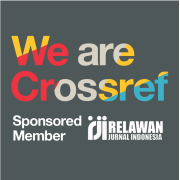Children Tv Series As Commodity In Culture Industry
Abstract
This paper will elaborate the struggle of Jalan Sesama TV series in the mid of media and commodities rivalry in the culture Industry. Library research was carried out in doing meta synthesis analysis by exploring the concept of commodity proposed by Theodor Adorno. From the conceptual elaboration, it was found that media still provide place for Jalan Sesama TV Series to do its creation. However, sooner or later, it will be banished and became a weird TV series among others.
Keywords
Full Text:
PDFReferences
Adorno, T. W., and M. Holkheimer. 1994. “The Culture Industry: Enlightement as Mass Deception (Transipted by Andy Blunden 1998, Proofed and Corrected Feb. 2005).” Marxists.
Bandura, Albert. 1986. Social Foundations of Thought and Action. edited by N. Prentice-Hall. Englewood Cliffs.
Berk, Laura. 2012. Development Through the Lifespan. %th. edited by Darmanto. Yogayakrta: Pustaka Pelajar.
Borzekowski, D. L. G., and J. Macha. 2010. “The Role of Kilimani Sesame on the Healthy Development of Tanzanian Preschool Children.” Journal of Applied Development Psychology 31:398–305.
Borzekowski, Dina L. G., and Holly K. Henry. 2011. “The Impact of Jalan Sesama on the Educational and Healthy Development of Indonesian Preschool Children: An Experimental Study.” International Journal of Behavioral Development 35(2):169–79. doi: 10.1177/0165025410380983.
Clendinning, Elizabeth. 2017. “The Music of Jalan Sesama (Sesame Street): Televised Indonesian Approaches to Teaching Cultural Diversity.” in The ICTM Study Group on Performing Arts of Southeast Asia.
Cole, C. F., C. Arafat, C. Tidhar, W. Z. Tafesh, N. A. Fox, M. Killen, and F. Young. 2003. “The Educational Impact of Rechov Sumsum/Shara’a Simsim: A Sesame Street Television Series to Promote Respect and Understanding Among Children Living in Israel, the West Bank, and Gaza.” International Journal of Behavioral Development 27:409–27.
Cole, C. F., D. B. Labin, and M. D. R. Galarza. 2008. “Begin with Children: What Research on Sesame Street’s International Coproduction Reveals About Using Media to Promote a New More Peaceful World.” International Journal of Behavioural Development 32:359–65.
Diaz-Guerrero, R., I. Reyes-Lagunes, D. B. Witzke, and W. H. Holtzman. 1976. “Plaza Sesamo in Mexico: An Evaluation.” Journal of Communication 26:145–54.
Fisch, S. M., and R. T. Truglio. 2001. “G” Is for Growing: Thirty Years of Research on Children and Sesame Street. Mahwah: NJ: Lawrence Erlbaum Associates.
Francis, C., and Baldesari. 2006. Systematic Reviews of Qualitative Literature. Oxford: UK Cochrane Centre.
Lewin, S. 2008. Methods to Synthesis Qualitative Evidence Alongside a Cochrane Intervention Review. London: London School of Hygiene and Tropical Medicine.
Moran, K. C. 2006. “The Global Expansion of Children’s Television: A Case Study of the Adaptation of Sesame Street in Spain.” Learning, Media & Technology 31:287–300.
Muppetnewsflash. 2007. “Indonesia Launches Jalan Sesama.” Retrieved October 18, 2017 (http://muppetnewsflash.blogspot.co.id/2007/03/indonesia-launches-jalan-sesama.html).
Perry, A., and N. Hammond. 2002. “Systematic Review: The Experience of PhD Student.” Psychology Learning and Teaching 2:32–35.
Roskos, Kathy, Dorothy Strickland, Janeen Haase, and Sakil Malik. 2009. “First Principles for Early Grades Reading Programs in Developing Countries.” The Clearing House: A Journal of Educational Strategies, Issues and Ideas 43(9):515–18. doi: 10.1080/00098655.1969.11477144.
Setiawan, Hilmi. 2007. “Muhammad Zuhdi: Tokoh Penting Dibalik Tayangan Serial Jalan Sesama.” Retrieved October 18, 2017 (https://www.jpnn.com/news/muhammad-zuhdi-tokoh-penting-di-balik-tayangan-serial-jalan-sesama).
Wikipedia. 2017. “Jalan Sesama.” Wikipedia.
Refbacks
- There are currently no refbacks.
Copyright (c) 2022

This work is licensed under a Creative Commons Attribution-NonCommercial 4.0 International License.

AGENDA: Jurnal Analisis Gender dan Agama distribute under Lisensi Creative Commons Atribusi-NonKomersial 4.0 Internasional
























